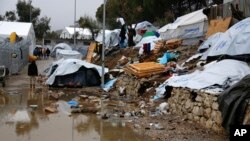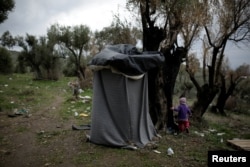More than 7,000 refugee and migrant children are living under horrible, unsanitary conditions on the Greek islands, the U.N. children's fund reports. It says more than 850 children, on average, make the dangerous sea journey to Greece every month only to end up in facilities that are congested and lacking all basic necessities.
UNICEF's country coordinator in Greece, Lucio Melandri, says he was appalled by what he saw on a recent visit to centers on the islands of Lesbos and Samos, where he met refugee children from Afghanistan, Iraq, Syria and the Democratic Republic of Congo.
"The vast majority of the children are deeply traumatized," Melandri said. "Many have lived through war and they have had to flee their homes. They have survived, but now find themselves living in horrible conditions with no end in sight. For many children, they simply cannot cope."
Melandri says housing on the islands is unacceptable, noting that the Moria Center on Lesbos hosts nearly 9,000 people in a facility meant for 3,000. In addition, he says the center on Samos was built for 650 people, but houses 4,000. He says staff is overwhelmed and services in the centers could collapse in the coming winter months.
All refugees and migrants living in the centers, especially children, must be transferred to the mainland without further delay, according to UNICEF. It says these vulnerable people must be given adequate accommodation, protection, health care and other basic services.





